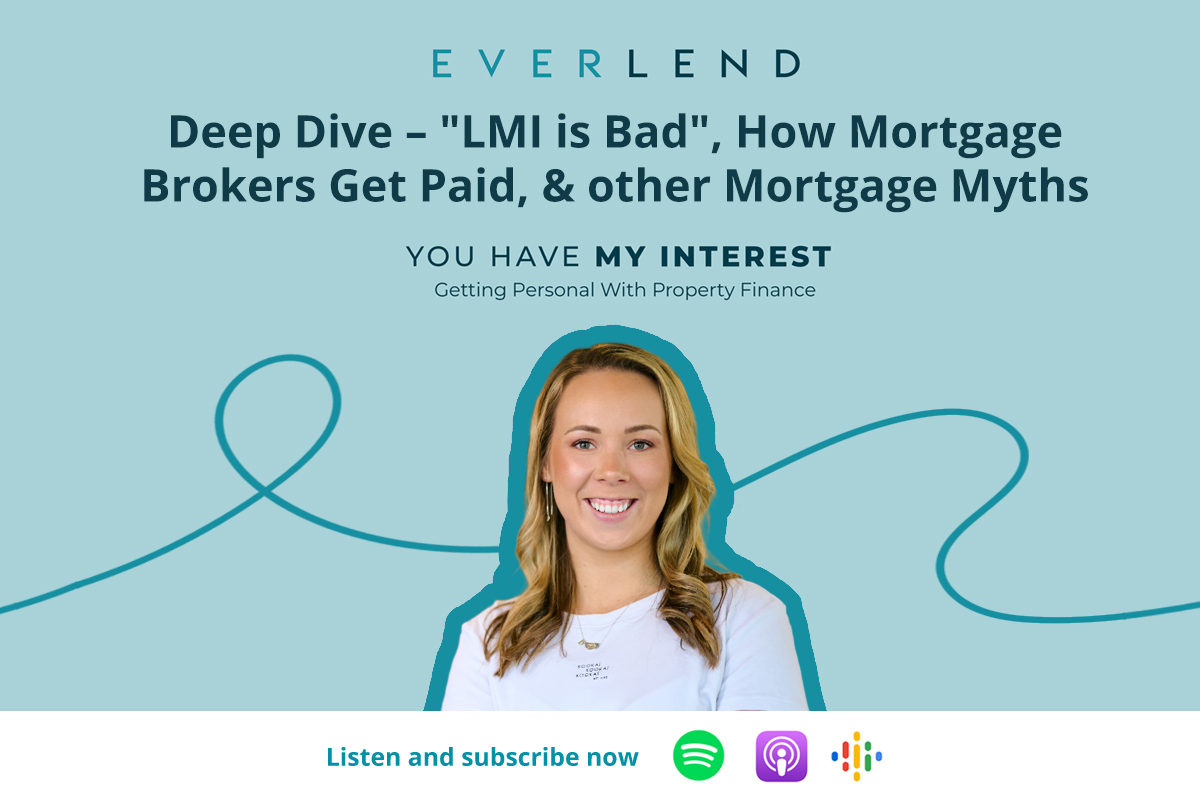
15 Aug 2024 Podcast: Deep Dive – “LMI is Bad”, How Mortgage Brokers Get Paid & other Mortgage Myths
In this episode, Evelyn breaks down common mortgage myths that often mislead potential homeowners. With interest rates in flux and the RBA recently pausing the cash rate, it’s crucial to understand these misconceptions.
Listen and subscribe now on Apple Podcasts or Spotify
Evelyn debunks myths such as needing a 20% deposit, the idea that mortgage brokers select lenders based on commission, and the belief that you must be in your job for a specific period before applying for a home loan.
She also discusses why Lenders Mortgage Insurance (LMI) isn’t always a negative and sheds light on how banks actually assess your spending habits and credit score.
Tune in to gain a clearer understanding of the mortgage landscape and make informed decisions on your journey to home ownership!
Find out your next step in property finance:
You Have My Interest is brought to you by Everlend, a mortgage and finance broking firm built for the purpose of educating and empowering you to make informed financial decisions tailored to your wealth goals. Find out more and book in your free initial consultation at
https://www.everlend.com.au/
There’s plenty more great content to come … so make sure you subscribe now on Apple Podcasts or Spotify so you don’t miss a thing.
You Have My Interest is brought to you by Everlend, a mortgage and finance broking firm built for the purpose of educating and empowering you to make informed financial decisions tailored to your wealth goals. Find out more and book in your free initial consultation at https://www.everlend.com.au/
Get in touch:
Find out more about You Have My Interest at everlend.com.au/podcast and connect with us at podcast@everlend.com.au
You Have My Interest provides information and educational content relating to mortgages, finance and property. You Have My Interest‘s content is general in nature and does not take into account the individual financial, legal or tax needs or objectives of its audience members.
It is not intended as a substitute for professional advice. Listeners should seek out a licensed professional to discuss their individual financial, legal and tax requirements.
If you need mortgage or finance advice tailored to your own personal situation, contact Everlend today for a free consultation. Everlend are authorised credit representatives of Loan Market Pty Ltd, Australian Credit Licence number 390222.
Podcast produced with Apiro
————————————————————————————————————————————————————————————————————————————————-
Please find a Podcast summary below with the interview highlights:
Deep Dive – “LMI is Bad”, How Mortgage Brokers Get Paid, & other Mortgage Myths
Podcast Highlights: Breaking Down Mortgage Myths with Evelyn
In this solo episode of *You Have My Interest*, Evelyn unpacks some common mortgage myths that often create confusion for home buyers. Drawing on her expertise, she addresses misconceptions and offers clarity to empower listeners in their property journey.
Key Highlights:
Social Media vs. Personal Circumstances:
Evelyn emphasizes the importance of tailoring financial advice to individual situations. Information online often oversimplifies or generalizes complex topics like mortgages.
Interest Rate Updates:
Fixed rates have seen significant drops recently, with Evelyn explaining the reasons behind these trends, including banks balancing their loan portfolios or pricing based on future projections.
Debunking Mortgage Myths:
Evelyn tackles seven pervasive myths, providing detailed explanations for each:
- Job Tenure Requirements: Lenders often accept borrowers in new jobs, even on probation, depending on industry and income stability.
- Spending Scrutiny: While banks review financial habits, they’re more focused on overall cash flow and undisclosed liabilities than minor expenses like dining out.
- Credit Cards & Scores: Unlike in the U.S., opening a credit card in Australia doesn’t necessarily improve credit scores and can sometimes harm them.
- 20% Deposit Necessity: Many options exist for buying a home with less than a 20% deposit, including lender’s mortgage insurance (LMI), government guarantees, and guarantor loans.
- LMI is “Bad”: LMI is often misunderstood. Evelyn reframes it as a tool to help buyers enter the market sooner rather than waiting to save a larger deposit.
- Interest-Only Loans: Contrary to belief, interest-only loans don’t increase borrowing capacity since lenders assess affordability based on future principal and interest payments.
- Mortgage Broker Bias: Brokers are legally obligated to act in their clients’ best interests and select loan products based on suitability rather than commission structures.
Home Loan Preparation:
Evelyn provides a practical checklist of documents needed for home loan applications, including ID, income proof, savings statements, and rental income records, ensuring listeners are well-prepared for the process.
Final Thoughts
Evelyn concludes with an invitation for listeners to share any additional questions or myths they’d like her to explore in future episodes. Her aim is to continue demystifying the mortgage process and empowering her audience with actionable knowledge.
